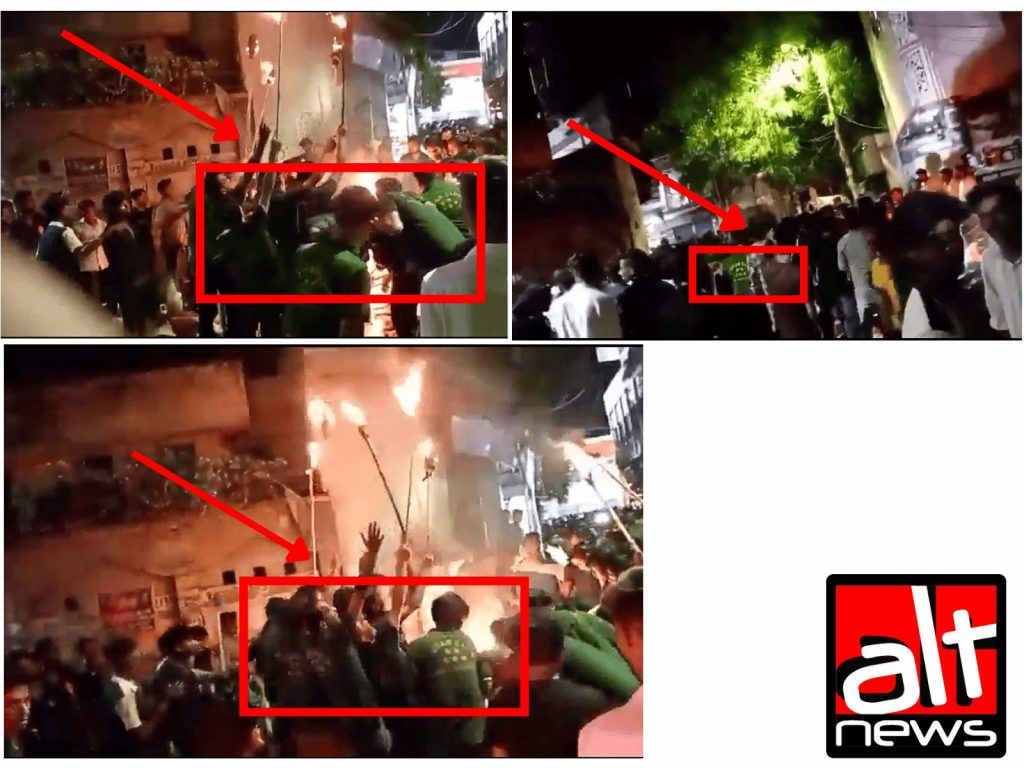 Pakistan Prime Minister Shehbaz Sharif (left) and Indian Prime Minister Narendra Modi IMAGE/PPI/AFP/The News
Pakistan Prime Minister Shehbaz Sharif (left) and Indian Prime Minister Narendra Modi IMAGE/PPI/AFP/The News
Troublemakers
Many leaders are averse to running their countries in a peaceful and progressive manner. Instead of concentrating on the problems the majority of their people face, they create trouble by introducing or undoing things, in order to gain political mileage and divert the public’s attention from important issues requiring government focus. The Indian Prime Minister Narendra Modi is one such leader.
In the Indian Lok Sabha, on August 5, 2019, Modi’s Home Minister Amit Shah announced revocation of Article 370 which had granted limited autonomy to the Indian occupied Kashmir.
Constitutional expert and eminent scholar A. G. Noorani told Akshay Deshmane what that revocation meant:
It is utterly and palpably unconstitutional. An unconstitutional deed has been accomplished by deceitful means. For a fortnight, the Governor and other people told a whole load of lies. And I am sorry that the Army Core Commander (Chief) was also enlisted to spread this false thing of inputs from Pakistan. It was all a falsehood. They have undermined the Army’s non-political character. This is patently unconstitutional. Thing is that I had always predicted that they are out to fulfill their Saffron agenda: Uniform Civil Code, Ayodhya and Abrogation of Article 370. It remains to be seen how they accomplish the Ayodhya agenda.
The Revocation of Article 370 was in complete violation of the 2018 Indian Supreme Court ruling which stated that Article 370 was a permanent part of the Indian Constitution and the only way it could be revoked was through the legislative body that had drafted the Article originally- only they could rescind it. That body, however, stopped functioning in 1957.
India’s first Prime Minister Jawaharlal Nehru said in the Lok Sabha on June 26 and August 7, 1952.
“I say with all respect to our Constitution that it just does not matter what your Constitution says; if the people of Kashmir do not want it, it will not go there. Because what is the alternative? The alternative is compulsion and coercion…” “We have fought the good fight about Kashmir on the field of battle… (and) …in many a chancellery of the world and in the United Nations, but, above all, we have fought this fight in the hearts and minds of men and women of that State of Jammu and Kashmir. Because, ultimately – I say this with all deference to this Parliament – the decision will be made in the hearts and minds of the men and women of Kashmir; neither in this Parliament, nor in the United Nations nor by anybody else,”
— Selected works of Jawaharlal Nehru, Vol. 18, p. 418 and vol. 19 pp. 295-6, respectively in A. G. Noorani, “Article 370: Law and politics,” Frontline, September 6, 2000.
That has never happened. The Kashmiri people have never been given a choice to decide their own destiny. Immediately after revoking Article 370, political leaders and thousands of Kashmiri civilians, including those who want Kashmir to be a part of India, were arrested. Kashmir and Jammu was locked down and all communication was blocked for eighteen months. Kashmir was cut off from the rest of the world.
Pahalgam
In September 2024, Kashmir Times’ editor Anuradha Bhasin told Al Jazeera:
“For the last five years, all Kashmiris have seen is an arrogant bureaucracy and the important missing layers of a local government.”
Rahul Gandhi, leader of the opposition in parliament, addressing a rally in the Jammu region said:
“Non-locals are running Jammu and Kashmir.” “Your democratic right was snatched. We have given priority to the demand for restoration of statehood.” “If [Modi’s party BJP] fails to restore statehood after the elections, we will put pressure on them to ensure it.”
Bhasin painted a gloomy picture:
“The hands of the clock have never moved back. Whatever has been taken from the people, in terms of their autonomy or democratic rights, has never been given back. I doubt that would change in the near future.”
In May 2024, Omar Abdullah, prior and the current Chief Minister since October 2024, had warned about presenting a rosy picture:
“The situation [in Kashmir] is not normal and talk less about tourism being an indicator of normalcy; when they link normalcy with tourism, they put tourists in danger.” “You are making the tourists a target.”
Praveen Donthi, a senior analyst at the International Crisis Group:
“New Delhi and its security agencies started buying their own assessment of peace and stability, and they became complacent, assuming that the militants will never attack tourists.” “But if pushed to the wall, all it takes is two men with guns to prove that Kashmir is not normal.”
While Modi was in Saudi Arabia, on April 22, 2025, terrorists associated with The Resistance Front killed 26 tourists in Pahalgam, a beautiful hill station and a favorite destination for visitors. The victims were asked about their religion and were killed on communal basis.
Modi cut short his Saudi Arabia visit and flew back to India’s capital city, Delhi where he didn’t mention Pahalgam at all.
However, Modi’s divisive inflammatory rhetoric and strategy is well known to the Bihar-based Rashtriya Janata Dal who predicted Modi’s politics:
“The pyres of the victims of the Pahalgam terrorist attack have not yet been lit, but the country’s Prime Minister will come to Bihar tomorrow to campaign and deliver speeches because Bihar is holding elections this year.”
Modi, as if on an election campaign in Bihar, the second most populous state (with a large Dalit and Muslim population), gave a fiery speech:
“Today from the soil of Bihar I say to the whole world. India will identify, track and punish every terrorist and their backers. We will pursue them to the ends of the earth.”
Veteran journalist Jawed Naqvi points out that in foreign countries Modi typically gives his speeches in Hindi but he gave this address using English to Bihar’s Hindi speakers (perhaps, to fully capitalize from the foreign press present.)
The accusing finger immediately implied Pakistan, rather than question the security lapse of the Indian security forces or trying to determine the perpetrators. Pakistan has been involved in the past but, this time no proof exists of its involvement. The rhetoric reached fever pitch and culminated in India’s attack on its neighbor, and when Pakistan asked for evidence of the accusation, India didn’t provide it.
Pakistan also offered to join a “neutral and transparent” investigation but India refused the offer.
India blamed Pakistan’s military chief Asim Munir’s speech of April 15, 2025 for the Pahalgam tragedy.
It’s a well known fact that Kashmir is the world’s most militarized zone with very numerous Indian check points all over the state. The question: where was Indian security? was not addressed by the government. Two months later, on June 22, the National Investigation Agency (NIA) arrested two persons who provided shelter to three persons involved in the act, according to NIA allegations.
Foreign Secretary Vikram Misri announced 5 major decisions taken by the Indian Government in April, 2025:
1. Suspension of the Indus Waters Treaty (1960) with Pakistan.
2. Immediate closure of the Atari Integrated Checkpost.
3. Cancellation of all SAARC Visa Exemption Scheme visas for Pakistani nationals.
4. Expulsion of defense, naval, and air advisors from the Pakistani High Commission in New Delhi.
5. Reduction of staff in both High Commissions from 55 to 30.
The CCS reaffirmed India’s resolve to bring perpetrators to justice and hold their sponsors accountable.
These are extreme measures that, if implemented, especially the water treaty suspension, will undoubtedly create more trouble and could result in a bigger war in the future.
On July 28, Indian government said its security forces killed three persons responsible for the April 22 killing.
Asim Munir
On April 15, while addressing the Overseas Pakistanis (OPs), Munir came out as Indian Hindu Modi’s Pakistani version: full of hate, divisiveness, and communalism.
“Our forefathers thought that we are different from the Hindus in every possible aspect of life. Our religion is different. Our customs are different. Our traditions are different. Our thoughts are different. Our ambitions are different.”
“… we are two nations, we are not one nation.”
The army, not popular in Pakistan for its constant interference in politics and disappearing critics and people as Balochis, seemingly, feels driven to frequently do something to make itself relevant. Munir’s speech to OPs was one such attempt.
India blaming Munir for Pahalgam attack does not seem very credible. The oppressed people, Kashmiris in India or Balochis in Pakistan, don’t need any inciting speech to fight back; they’re just waiting for the right time because they don’t have the luxury of attacking at will, like the governments do, in the name of “national security.” The oppressed can’t reach the state so they attack innocent people to communicate their plight.
In Pakistan, Baloch separatists have stopped buses and killed Punjabis after checking their IDs, perhaps in revenge as Punjab is Pakistan’s most populous and dominant province, and has a strong hold over the central government.
The attacks are cruel, but these kind of ugly incidents may continually occur if governments involved refuse to negotiate and reach amicable solutions.
War
On 29 April, Indian government sources quoted Modi: “They [the Indian army] have complete operational freedom to decide on the mode, targets, and timing of our response,”
On May 7, India struck some sites in Pakistan, that then counter-struck.
India’s Israeli Ambassador Reuven Azar posted on X: “Israel supports India’s right for self-defense. Terrorists should know there’s no place to hide from their heinous crimes against the innocent.”
Israeli Prime Minister Benjamin Netanyahu to Modi: “Israel stands with India in its fight against terrorism.”
There can be no better person than Netanyahu, the great terrorist and genocider, to advice another terrorist.
Trump’s ceasefire
The four-day-war ended when US President Donald Trump announced a ceasefire on his Truth Social media site:
“I am pleased to announce that India and Pakistan have agreed to a FULL AND IMMEDIATE CEASEFIRE.”
Propaganda
In 2014, when Modi was to become Prime Minister for the first time, Amit Shah had bragged about BJP having 3.2 million WhatsApp groups who could instantly turn anything into believable stuff. In May 2024, BJP had at least 5 million WhatsApp groups and its infrastructure is so strong that any message relayed from Delhi could circulate all over India within 12 minutes.
Kiran Garimella of Rutgers University who researches WhatsApp in India, warned that WhatsApp is not an open social media like X or Facebook which is worrying and a cause for concern for many people.
“It is concerning that such a huge ‘hidden’ infrastructure plays a huge role in how the public consumes information.” “Only the creators of these groups know the extent to which the tentacles of this WhatsApp infrastructure are spread.”
What is the result?
War is like a game to the war inciters, war lovers, war media, and common people under the spell of the media frenzy and are most interested in the one question, who won and who lost?
The winners
There were two clear winners: Indian news media and the Pakistan army and its Chief of Army Staff: Asim Munir.
False news stories and AI generated images came from both sides but India was way ahead in fake news:
- Indian Navy destroyed sea port Karachi, Pakistan’s largest city and financial center, with “over ten blasts.”
- The city of Peshawar was turned to “dust.”
- Pakistani soldiers were “deserting” and generals were “fleeing” the country,
- Some channels announced destruction of 5 cities where as another settled for 26 cities
- India’s fake news-master Arnab Goswami also declared a huge blast was heard outside Pakistan PM’s house and he was taken away to a place “20.5” kilometers (12.74 miles) away. Goswami also said it’s not clear whether it was for a safety reason or was it a coup.
- Zee News declared a coup happened resulting in the arrest of General Asim Munir.
- and so on…
For a very long time now, most Indian media has turned into “Godi Media,” a term used by Ravish Kumar, the prestigious Ramon Magsaysay Award winner. (Kumar was NDTV India’s Managing Editor but left when it was bought by billionaire Gautam Adani, a Modi supporter and fellow Gujarati.)
Kumar queried as to who should get an award for riveting fake news?
- News Nation who gave news of Sharif on the run or,
- Zee News who located Sharif, who was never missing?
Sumitra Badrinathan, an assistant professor at the American University, observed in an interview with the New York Times that in India “previously credible journalists and major media news outlets ran straight-up fabricated stories [on the 4 day war].”
The losers
The victims of the bombings, dead or wounded, are always the first ones to endure the horrors of war. They are the losers.
Pakistan said 40 civilians and 13 military personnel were killed. India’s figure was 21 civilians and 8 military and paramilitary personnel died. Hundreds of people on both sides got injured.
The politicians and generals on both sides claimed victory. The war was of a very short duration, thus politicians and generals didn’t feel populace hostility or face dire consequences like resignations.
Winner and loser honor
That honor goes to Modi. He was a winner and also a loser.
- Modi the winner. To his followers, Modi’s heroism enhanced when the Indian news media falsely started giving way too inflated stories of India beating Pakistan.
- Modi also succeeded in cutting off whatever little cooperation existed between Indians and Pakistanis through arts and sports. The Indian government ordered all Pakistani songs removed from Spotify. All media streaming services, digital intermediaries, and OTT platforms were ordered to discontinue Pakistani films, web series, songs, etc. Pakistani TV channels and dramas, very popular in India, were banned and still are. Pakistani artists and sportspersons social media accounts were blocked and still are.
- The extent of Modi’s hatred can be gauged from the following film posters: before and after.
 Indian actor Harshvardhan Rane and Pakistani actress Mawra Hocane in Indian film poster of Sanam Teri Kasam IMAGE/BrandSynario/Duck Duck Go
Indian actor Harshvardhan Rane and Pakistani actress Mawra Hocane in Indian film poster of Sanam Teri Kasam IMAGE/BrandSynario/Duck Duck Go
 In an Orwellian move, Pakistani actress Mawra Hocane was removed from the film poster of Sanam Teri Kasam IMAGE/Hindustan Times/Duck Duck Go
In an Orwellian move, Pakistani actress Mawra Hocane was removed from the film poster of Sanam Teri Kasam IMAGE/Hindustan Times/Duck Duck Go
The original film poster had Mawra Hocane but in the revised one, Hocane disappeared in an Orwellian manner. Shah Rukh Khan‘s movie posters of Raees with Pakistani actress Mahira Khan have faced the same fate.
- Indian singer, actor, producer Diljit Dosanjh film Sardaar Ji 3 with the Pakistani actress Hania Aamir got banned in India. The Federation of Western India Cine Employees (FWICE) appealed to Prime Minister Narendra Modi, Home Minister Amit Shah, Minister of External Affairs S Jaishankar and Minister of Information & Broadcasting Ashwini Vaishnaw to revoke passports of Daljit Dosanjh, Gunbir Singh Sidhu, Manmord Sidhu and Director Amar Hundal. Just for working with a Pakistani artist, thus displaying the toxic mixture of hate, idiocy, and faulty logic.
- FWICE’s letter contained many lies about Hania Aamir who had lamented the loss of life: “I don’t have fancy words right now. I just have anger, pain, and a heavy heart. A child is gone. Families are shattered. And for what? This is not how you protect anyone. This is cruelty – plain and simple.
Mind you, Modi personally may not be giving orders, but, people get emboldened to inflict damage as they know they won’t be stopped.
Many fields of life, from economics to education and from culture to cricket, have suffered due to rigidity, egotism, and ideology of politicians on both sides. Pakistani military’s control over politicians has never let both countries cooperate and utilize fully the trade, talents, and technology. Hardly a 100 or so Pakistani artists and playback singers have ever worked in Indian films.
Official trade between both countries has dropped and is routed through Singapore, Colombo (Sri Lanka), and Dubai (UAE), costing more money. Even in peace times, these routes are used for trade due to some or other reason. It’s foolish, but than you can’t make people with power to understand, because the powerful don’t allow discussions or arguments.
Modi the loser. On May 10, 2025, at 6:55 A.M. Eastern Time (that is 4:55 P.M. Pakistan time and 5:25 P.M. Indian time) on his Truth Social site, Trump announced:
“After a long night of talks mediated by the United States, I am pleased to announce that India and Pakistan have agreed to a FULL AND IMMEDIATE CEASEFIRE. Congratulations to both Countries on using Common Sense and Great Intelligence. Thank you for your attention to this matter!”
It was sobering news for Modi. Modi has created an image of himself as Indian superman with broad 56-inch chest who is globally famous giving hugs to presidents, prime ministers, billionaires, whether they want it or not. He has made 91 foreign trips till July 2025. He has made India a superpower not in reality but by creating such perception. Modi who likes to control the narrative and who desperately wanted to announce victory had to get a ceasefire order from Trump. Trump is such a character that you can’t argue with him because then you face more humiliation — not because Trump is more vitriolic than Modi but because US is economically much more stronger than India, who is economically heavily interconnected with the US.
Imbecile
Then there is Pakistan’s Prime Minister Shehbaz Sharif. He got so carried away by Pakistan army’s downing of less than half a dozen Indian fighter planes that he equated it as a victory compensating for the loss of half the country (55% of its population in 1971) when East Pakistan seceded with Indian help to become independent Bangladesh.
That is clearly just a fictional ego boosting comparison.
Unpredictable Outcome
Who could have predicted that Modi’s war would give Pakistan army and Munir a new lease on popularity?
Avoid war
Poet Sahir Ludhianvi’s poem O Decent People has a quatrain:
whether the blood spilled is ours or theirs
it is the blood of Adam’s progeny, after all
whether the war is in the east or west
it is the murder of world peace, after all
War should be avoided at all cost. All wars between Pakistan and India inflict tremendous cost in lives and finances, and, affect the entire South Asian region.
Both possess nuclear weapons which if, by mistake or bravado, get deployed in the war, would end in great disaster for the entire world. According to climatologist Alan Robock, 1,000,000,000 to 2 billion people would face starvation worldwide, in such case, there would be immediate climate changes, leading to much colder weather than the Little Ice Age and many other disasters, including destruction of ozone layer.
Dinner date
Trump advised Indian and Pakistani leaders to go for a dinner date.
“Maybe we can even get them together a little bit, Marco [Rubio, the US Secretary of State], where they go out and have a nice dinner together. Wouldn’t that be nice?”
Improve relations
The population of South Asia, including Afghanistan, comprises 25% of global population. With China’s 17% added, the percentage shoots up to 42%.
The World Inequality Lab study observed that income and wealth contrast in Modi’s India is worse, more than it was during the British colonial rule. Other countries in the region are not any better.
Suggestions:
- If 42% of people increase trade in way that exchange of dollars is minimized, either through barter trade or using own currencies, this would save them hustle for dollars and foreign exchange.
- Increased trade also brings people closer and aids in creating more understanding and tolerance.
- In the best interest of both countries and the entire South Asian region, it would be better if SAARC (South Asian Association of Regional Cooperation) is revived.
- Visas should be issued to enjoy tourism and appreciate each other’s natural beauty of land, flora and fauna and cultures
- Exchange student programs should be initiated
- Joint cultural, artistic, sports, entertainment, and other such events should be organized and promoted.
- India and Pakistan should avoid competing to get in the good books of US administration and try to sort out their problems themselves.
- Pakistan feels insecure when Trump is close to Modi and vice versa.
- India is the most populous country and Pakistan is the fifth most populated nation, both are made of many nations held together with very weak ties. They should concentrate on making that connection stronger by addressing the problems of various ethnic, caste, gender, and religious groups and by improving relations between the countries of SAARC.
Gur Mehar Kaur, whose father died during one of the Indo-Pak wars when she was 2 year old, wishes peace:
“… Only mutual cooperation can drive South Asia ahead. A peaceful subcontinent is the greatest gift we can give our families, our soldiers and ourselves.”
“Hate is the most anti-national force that we face. The worst thing the BJP under Modi did was nurture a mob that can only be satisfied with blood, killings and hate. For 10 years, this mob has been empowered.”
Notes:
The post
Indo-Pak Leaders Should “Have a Nice Dinner Together” first appeared on
Dissident Voice.
1 In the Shanghai Communique, 1972,
the US declared:
The United States acknowledges that all Chinese on either side of the Taiwan Strait maintain there is but one China and that Taiwan is a part of China. The United States Government does not challenge that position.
For almost five decades, peace prevailed between China and the United States on the issue of Taiwan. The above policy was maintained without any serious incident. It could have gone on for decades but for some US generals and others who visited Taiwan in March 2022. Author Eve Ottenberg surmised, “
to beat the war drums and provoke China.” Same year in August,
Nancy Pelosi visited Taiwan too, to incite China.
The “
world’s greatest democracy” seems
devoid of a peace gene; it follows it’s own motto: “
I war, therefore I am.”
2 In 1924,
1,165 in-person hate speech events took place in India; 259 were openly calling for violence. Many
important BJP leaders, including Modi, his Home Minister Amit Shah, and Yogi Adityanath, the rogue governor of largest state Uttar Pradesh, were involved in these events.
3 The 2016, the Indian film
Sanam Teri Kasam had a Pakistani actress Mawra Hocane as the female protagonist. The film was re-released in February and became
highest-grossing re-released Indian film. They are making a sequel but now without Hocane because of the war. (VIDEO/Soham Rockstar Entertainment/
Youtube)Dosanjh made a great move. He didn’t implore authorities for the film to be released in India but instead had it released worldwide, including Pakistan, where it became the
second highest-grossing film in Pakistan’s history. It is also the
highest-grossing Punjabi language film internationally. The film has made
almost double the money it
cost to make the movie. (VIDEO/White Hill Music/
Youtube)
Dosanjh’s actions will encourage those Indian and Pakistani artists who wants to collaborate to release their work worldwide to cover the cost and make profit internationally, rather than be at the mercy of local politicians’ whims. Indian film
Abir Gulaal with Indian actress
Vaani Kapoor and Pakistani actor
Fawad Khan was to release on May 9 but was postponed indefinitely. The makers should think of forgoing the Indian market and releasing it worldwide if possible and if it won’t hurt them financially.
This post was originally published on Dissident Voice.



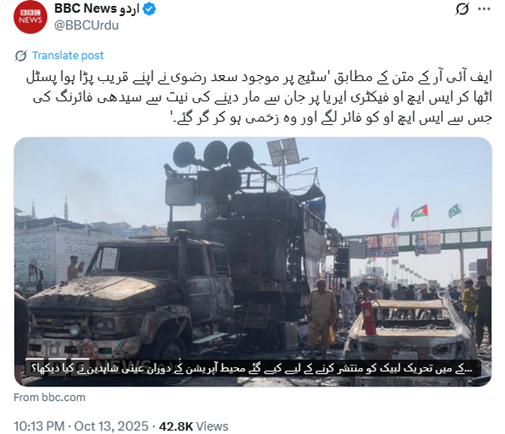
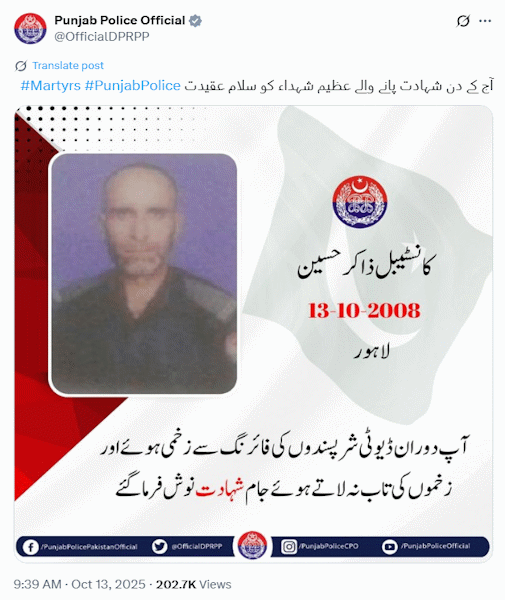
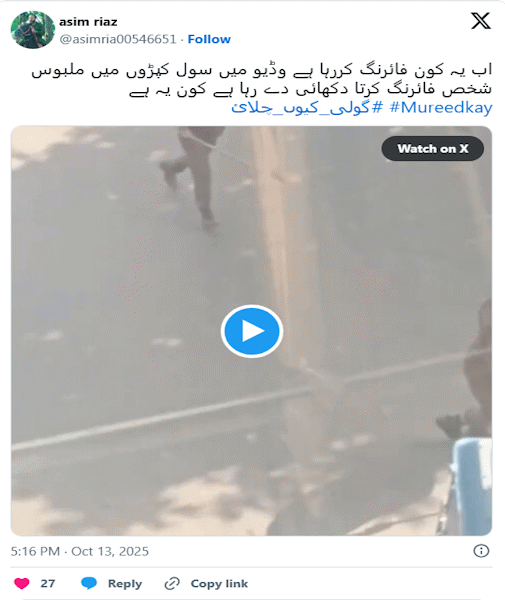
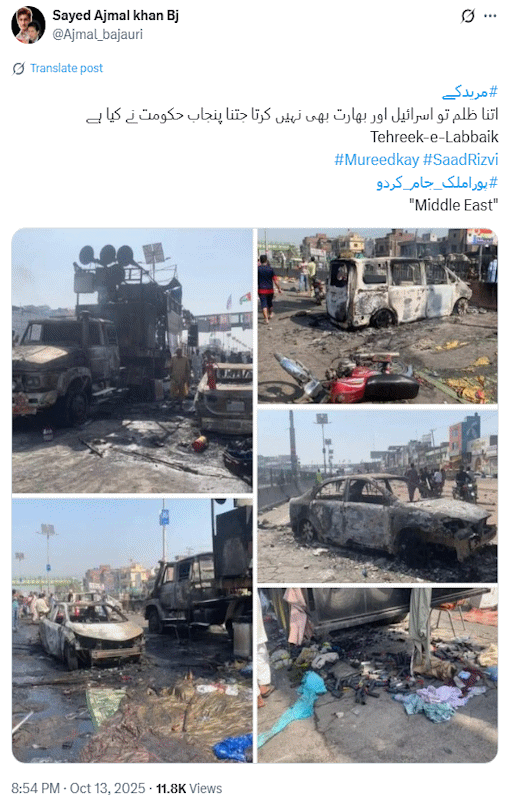
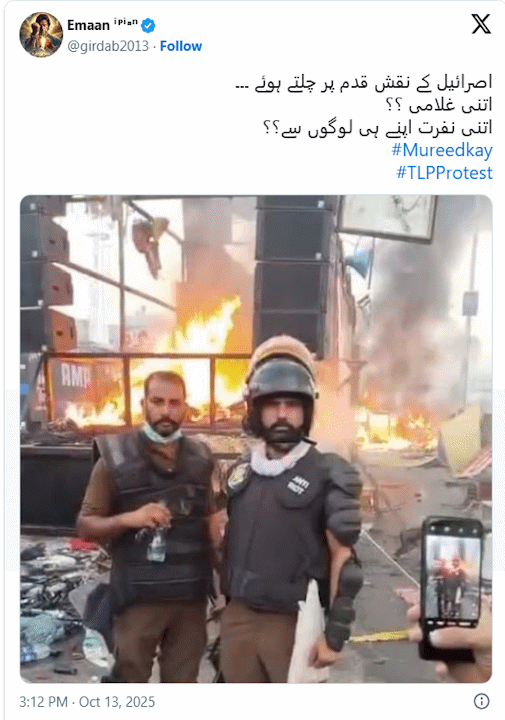
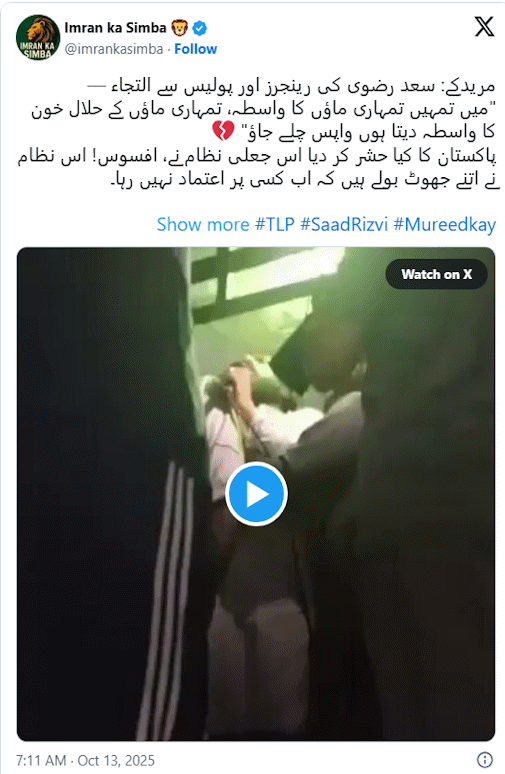
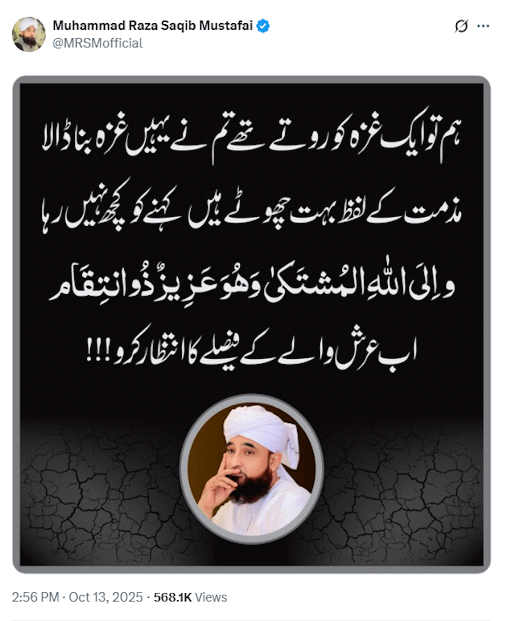
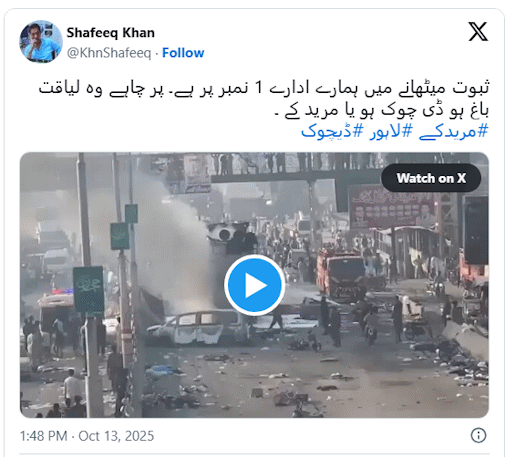
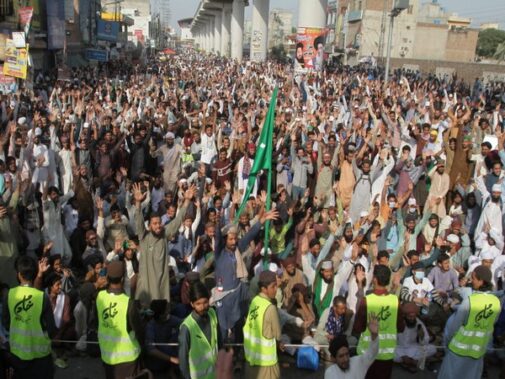
 Priyantha Kumara was a Sri Lankan export manager in a factory in Sialkot, Pakistan who was falsely accused of insulting Islam. He was beaten to death and his body was set on fire on December 3, 2021. IMAGE/
Priyantha Kumara was a Sri Lankan export manager in a factory in Sialkot, Pakistan who was falsely accused of insulting Islam. He was beaten to death and his body was set on fire on December 3, 2021. IMAGE/

 Shanti Maheshwari in a bridal dress; her husband Ashok Kumar is behind the bars IMAGE/
Shanti Maheshwari in a bridal dress; her husband Ashok Kumar is behind the bars IMAGE/ From beautiful bride, to victim of marital rape, this is the story of Shanti, a 19-year-old whose husband has been charged under the Domestic Violence (Prevention and Protection) Act of 2013. IMAGE/
From beautiful bride, to victim of marital rape, this is the story of Shanti, a 19-year-old whose husband has been charged under the Domestic Violence (Prevention and Protection) Act of 2013. IMAGE/ Najma (center), Sonya (head covered), and their brother (Najma’s right) were sitting on the pavement outside the trauma center where Shanti was fighting for her life. IMAGE/Seema Maheshwari
Najma (center), Sonya (head covered), and their brother (Najma’s right) were sitting on the pavement outside the trauma center where Shanti was fighting for her life. IMAGE/Seema Maheshwari Pakistan Prime Minister Shehbaz Sharif (left) and Indian Prime Minister Narendra Modi IMAGE/PPI/AFP/
Pakistan Prime Minister Shehbaz Sharif (left) and Indian Prime Minister Narendra Modi IMAGE/PPI/AFP/ Indian actor Harshvardhan Rane and Pakistani actress Mawra Hocane in Indian film poster of Sanam Teri Kasam IMAGE/BrandSynario/
Indian actor Harshvardhan Rane and Pakistani actress Mawra Hocane in Indian film poster of Sanam Teri Kasam IMAGE/BrandSynario/ In an Orwellian move, Pakistani actress Mawra Hocane was removed from the film poster of Sanam Teri Kasam IMAGE/Hindustan Times/
In an Orwellian move, Pakistani actress Mawra Hocane was removed from the film poster of Sanam Teri Kasam IMAGE/Hindustan Times/ Model, theatre artist, media influencer, and actress Humaira Asghar Ali IMAGE/
Model, theatre artist, media influencer, and actress Humaira Asghar Ali IMAGE/ IMAGE/Humaira Asghar Ali Twitter/
IMAGE/Humaira Asghar Ali Twitter/ IMAGE/
IMAGE/ IMAGE/Humaira Asghar Ali Twitter/
IMAGE/Humaira Asghar Ali Twitter/
